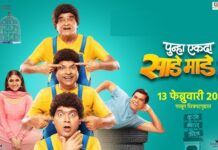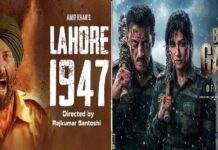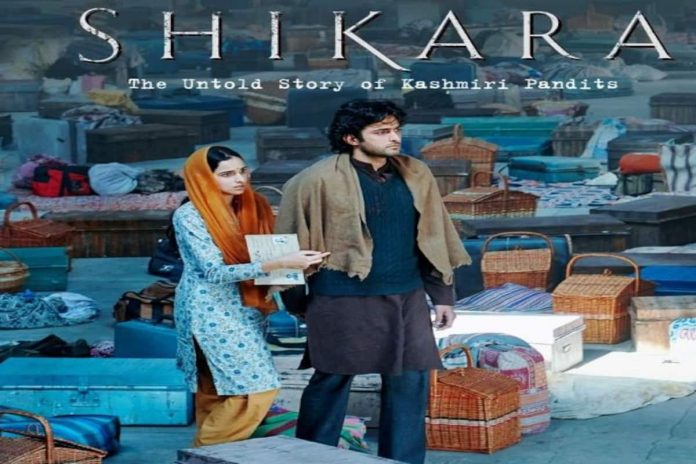Vinod Chopra Films and Fox Star Studios’ Shikara (UA) is the story of the mass exodus of Kashmiri Pandits from Kashmir in 1990 due to Muslim militancy.
The heart-wrenching story is narrated through the eyes of a Kashmiri Pandit couple. Shiv Kumar Dhar (Aadil Khan) gets married to Shanti (Sadia). Soon, the two build their home, Shikara. Life is going on but before anyone knows it, Muslim militants, supported by Pakistan, get agitated when a Muslim leader, Khursheed Hassan Lone (Zamir Ashai), is killed. Muslims go on the rampage and force Kashmiri Pandits to flee Kashmir, leaving their homes and belongings. Incidentally, Shiv and Shanti were very close to Khursheed Lone and, in fact, Khursheed’s son, Lateef Lone (Zain Khan Durrani), is Shiv’s best friend. The story talks about the plight of the Kashmiri Pandits who were forced to live the life of refugees in their own country. Alongside this story of Kashmiri Pandits, there is also the love story of Shiv and Shanti. On their wedding day, Shanti had expressed a desire to see the Taj Mahal in Agra with her husband. How her dream is fulfilled by Shiv is also shown in the film.
Writers Vidhu Vinod Chopra, Rahul Pandita and Abhijat Joshi have penned a story about the pain and sufferings of Kashmiri Pandits but they (pain and sufferings) have been toned down drastically. Resultantly and even otherwise, such a heartbreaking incident in the history of Kashmir fails to have the desired emotional impact. Secondly, although the focus is on Shiv and Shanti, there is not much that’s different for them from what is in store for the other Kashmiri Pandits. In other words, neither do Shiv and Shanti do anything that’s heroic nor are their sufferings highlighted after a point. Because of this, they don’t appear like the hero and heroine of the drama which unfolds. And when, in the second half, the focus does shift to them, the story has moved many years ahead and the spotlight is on their personal love story. So what started as the main story suddenly becomes just the backdrop for the love story which, in the first place, was not the main story. In other words, the main story is relegated to the background, and the background story comes in the forefront. This gives the viewers an impression of it being a flawed work of scripting because the entire drama is about Kashmiri Pandits but the climax is about a couple and its love story. The story and screenplay are, therefore, not upto the mark. Also, the pace drops at many places, making the drama boring and loose. The dialogues, written by the trio, are fair but needed to have more patriotism packed into them.
Sadia is a natural actress and does a very fine job in her debut attempt. She plays Shanti very effectively. Aadil Khan is good as Shiv Kumar Dhar. Priyanshu Chatterjee lends able support as Naveen. Zain Khan Durrani stands his own as Lateef Lone. Bhavna Chauhan (as Aarti), Ashwin Dhar (as Mohanlal), Farid Azad Khan (as Rehmana), Saghar Sehrai (as Haji Sahab), Mushtaq Kak (as Masood Sahab), Zamir Ashai (as Khursheed Hassan Lone), Anjana Sood (as Shiv’s mother), Vinay Raina (as Shiv’s father), Faiyaz Dilbar (as Shanti’s father), Shahid Lateef (as political leader Yunus), Dr. Ajay Kaul (as Manoharlal Kaul), Ashok Vinay Pandita (as the travel agent), master Madhav Dhingra (as kid Ladroo), Faisal Simon (as leader Ladroo), Sanjeev Gupta and Sandeep Verma (both as registration officers in Jammu), and the others lend ordinary support.
Vidhu Vinod Chopra’s direction is fair. Although the story is nerve-wracking, his narration (as also the script) is unable to bring to the fore the emotional side of the drama. Music (Sandesh Shandilya and Abhay Sopori) is melodious but none of the songs is of the popular variety. Lyrics (by Irshad Kamil) are nice. A.R. Rahman and Qutub-E-Kripa’s background music is alright. Rangarajan Ramabadran’s cinematography is nice. The locations and the feel of the drama have been effectively captured by him in the camera. Sonal Sawant’s production designing is appropriate. Editing (by Vidhu Vinod Chopra and Shikhar Misra) could’ve been sharper.
On the whole, Shikara is a good story not told well enough and it will, therefore, go largely unnoticed. A thin section of the class audience will, of course, give the film the thumbs up because of the subject it tackles. But the majority will give the film the cold shoulder.
Released on 7-2-’20 at Regal (daily 1 show) and other cinemas of Bombay by Fox Star Studios India Pvt. Ltd. Publicity: poor. Opening: very weak. …….Also released all over. Opening was bad everywhere.





























